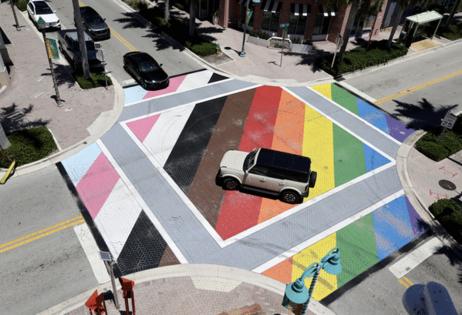State will remove LGBTQ+ pride intersections if Delray Beach, Key West don't do it themselves
Published in News & Features
The reprieve for Delray Beach’s LGBTQ+ pride intersection didn’t last long.
On Friday, the southeast Florida district secretary of the state Department of Transportation ordered City Manager Terrence Moore to have the pride intersection removed by Sept. 3.
If the city doesn’t comply, district secretary Steven C. Braun wrote, the state will remove the intersection however it sees fit, with no further notice, and bill the city for the cost.
Braun said the city can avoid the costs of state removal by removing the markings and “notify(ing) the Department of compliance immediately.”
And, he warned: “Any additional violations by the City of Delray Beach shall be cause for the immediate withholding of state funds.”
The city can request a hearing, Braun’s letter said, but the outcome is preordained. Any hearing would be Sept. 2, the day before the deadline — in Orlando. A hearing would not consider a request for an exception or a waiver allowing the painted intersection to remain. And, the letter added, “The Department has already reviewed the pavement markings … and determined that the pavement markings will not be allowed.”
The Transportation Department issued the order three days after a majority of Delray Beach city commissioners said they didn’t want to remove the intersection painted with rainbow colors that honors LGBTQ+ residents and visitors.
Key West received its version of the same letter late Friday afternoon. The only differences were the location of the intersection, the date of a possible hearing, the person signing it, and the city manager it was addressed to.
Key West’s letter was sent by Daniel Iglesias, the transportation secretary for the district that includes Monroe County. A hearing, if the city requested one, would be held on Sept. 3, the same day as the deadline for removal.
Miami Beach, which has a rainbow crosswalk at Ocean Drive and 12th Street, has not received a letter from the state, a spokesperson said Monday.
Local elected officials’ support for the LGBTQ+ community runs counter to the political winds blowing from Tallahassee and Washington, D.C.
On July 1, President Donald Trump’s transportation secretary, Sean Duffy, decreed that pride intersections don’t belong on public roads. Writing on social media, Duffy said that “Taxpayers expect their dollars to fund safe streets, not rainbow crosswalks.”
The next day, Gov. Ron DeSantis’ transportation secretary, Jared Perdue, endorsed Duffy’s statement. Writing on social media, Perdue said Florida wants to “keep our transportation facilities free & clear of political ideologies.”
Perdue attached a memorandum to his post explaining how the state would enforce its mandate: a threat to withhold state money from noncompliant cities.
Two of the three Palm Beach County cities with rainbow intersections, Boynton Beach and West Palm Beach, immediately complied or said they would do so quickly.
Moore said Delray Beach would do the same. But his decision was countermanded by three of the five city commissioners at their Aug. 12 meeting. They said there shouldn’t be any removal at least until the city was explicitly told what to do by the state.
The city’s defiance received attention in news coverage and the state letter followed.
What appears as if it’s the coup de grâce for the intersection comes at a time of a rapidly shifting political environment surrounding the LGBTQ+ community and related issues. Efforts that support diversity, equity and inclusion have been disbanded by federal and state governments. The state last month started a Florida DOGE scrutiny of local government spending for, among other things, evidence communities are promoting so-called DEI.
The Delray Beach-based LGBTQ advocacy organization Truth Wins Out said in a statement Monday that orders to remove rainbow-colored crosswalks is “an effort driven not by safety concerns, but by authoritarian impulse to marginalize LGBTQ people,” which it said is part of a “DeSantis-Trump campaign” to impose its worldview on those who disagree.
Wayne Besen, executive director of Truth Wins Out, praised local government leaders “choosing inclusion, courage and democracy over complicity,” adding, “We are grateful that these Florida cities are not obeying in advance and meekly succumbing to tyranny.”
Delray Beach didn’t immediately respond Monday to voice, text and email messages about the ruling from the state. A spokesperson said the Key West city attorney is reviewing its letter.
The letters from the state didn’t refer to the rainbow colors or the LGBTQ+ community or issues; it specified the locations of the intersection. The Delray Beach intersection is at Northeast First Street and Northeast Second Avenue. The Key West intersection is at Duval and Petronia streets.
The letter noted that “many local jurisdictions” received the general state memorandum about what the state regards as legal and illegal traffic control devices and “immediately began undertaking actions to ensure compliance.”
“However, the City of Delray Beach has publicly stated it does not intend to comply,” the district secretary wrote. He said his letter served as “an additional notification.”
The same wording was used for Key West, where city commissioners voted Aug. 6 to “express its deep concern and opposition” to removal and direct the city attorney’s office to “assess all legal and administrative options to preserve the rainbow crosswalks.”
The Delray Beach intersection is painted as the progress pride flag, the current symbol for the LGBTQ+ community.
Most of it consists of the six rainbow stripes that are a familiar symbol LGBTQ+ pride. It also includes triangular black and brown stripes to represent people of color and baby blue, pink and white stripes to include colors of a transgender flag.
The city spent $16,000 in 2021 to design and install the intersection and apply a non-slip surface. Paint was reapplied a year later for $2,500. Subsequent repaintings — including $5,759 this year for the beginning of LGBTQ+ Pride month in June — cost $5,300 to $5,800, the city said previously.
_____
©2025 South Florida Sun-Sentinel. Visit sun-sentinel.com. Distributed by Tribune Content Agency, LLC.







Comments